The question of pregnant belly vs fat belly usually arises when a woman wakes up one morning, looks at herself in the mirror, and wonders, “Why is my belly all of a sudden so big?”
Don’t worry!
You’re not the only one. When it comes to this pregnant belly vs. a fat belly topic, there are many things I’ll discuss today to help you distinguish them.
First things first, if you’re pregnant, you will most likely start experiencing early pregnancy symptoms.
If you still haven’t, then maybe you will soon because, after all, a growing baby in your stomach cannot be “asymptomatic.”
Of course, you can always take a pregnancy test, to see if the test will show if you’re having a growing baby in your tummy or not.
So without further ado, I will immediately give you all the necessary information regarding a pregnant belly vs a fat belly so you can know what’s going on.
Difference Between Pregnant Belly And Fat Belly
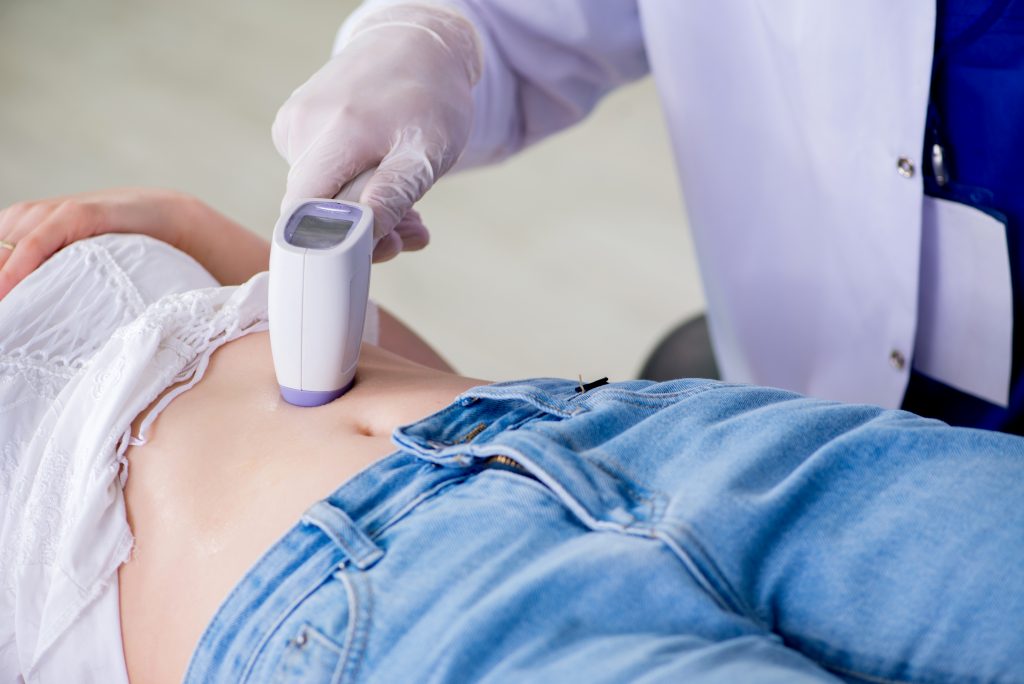
Pregnant Belly vs. a Fat Belly – Fat Belly Is Soft
One of the main differences between a pregnant belly and a fat belly is the fact that a fat belly is very soft, unlike a pregnant one, which is always firm due to a growing baby.
Since you’ll be having a baby inside your tummy, it won’t stretch only the abdominal area but will press against other organs.
That’s precisely one of the reasons why your belly becomes very hard and round and can almost instantly be noticed, even during the first trimester.
Conversely, most fat bellies tend to be very soft and squishy (like mine).
The fat on your tummy is so-called subcutaneous fat, which refers to the fat that’s underneath your skin. The amount of it depends on your physical activity, genetics, and nutrition.
Another thing that must be mentioned when it comes to this pregnant belly vs a fat belly topic is the fact that you can have a firm stomach even if you’re not pregnant.
How come?
The main cause of it is visceral fat, which refers to the fat that surrounds your organs and can potentially cause various health conditions and can, at times, be very detrimental.
Pregnant Belly vs a Fat Belly – They Hit Different Regions Of Your Abdomen
Another significant difference between a pregnant belly and a fat belly is the fact that a fat belly develops in the upper part of your tummy, while a pregnant one is in the lower.
Once you’re in the fourth or fifth month of the pregnancy, the uterus will start pressing your abdominal wall from the outside.
By then, you will most likely feel like you have a bulge in your belly.
On the flip side, a fat belly causes the accumulation of fat deposits in the upper area of your stomach.
Sometimes, it can be difficult to foresee which part of your abdomen is going to extend first (this refers to pregnant women) because it’s different for everyone.
Factors that influence this are weight, height, and body type.
Also, the situation can be different with women who have given birth before and first-time moms.
There are various things that can affect the appearance of your pregnant belly. As a first-time mother, you will most likely notice a bulge between 12 and 16 weeks.
On the flip side, women who have been pregnant before will probably see it sooner because their abdominal walls have already been stretched in the past.
Of course, and then we have the number of babies that are inside. If you have one baby, the belly bump will be much more minor than having twins or more.
In addition, women who are overweight will notice the baby bump later than women that are fit or slim.
Pregnant Belly vs a Fat Belly – Fat Belly Has Layers, While Pregnant Doesn’t
Another (out of so many) difference between a pregnant belly and a fat belly is in their appearance.
A pregnant belly is normally very round and can look like a puffed balloon.
Why is that?
That’s because only your belly becomes bigger and that’s mostly the case with the lower region, near the uterus.
If you’re overweight, then you’ll also notice that other parts of your body are going to be a bit softer.
Although there are some differences between a pregnant belly and a fat belly, remember that these situations do not have to be always mutually-exclusive.
Pregnant Belly vs a Fat Belly – Fat Belly Is Lighter
Another way you can tell the difference between a pregnant belly and a fat belly is the fact that a fat belly is lighter.
As time passes, you’ll feel heavier, and your lower back will soon start hurting. (somewhere around the 20th week)
It will become difficult for you to walk, sit, and even lie down normally. Plus, some pregnant ladies are not capable of sleeping well.
At some point, as your belly becomes larger, you will start noticing stretch marks and your uterus will align to the belly button.
Numerous Types of Fat Belly
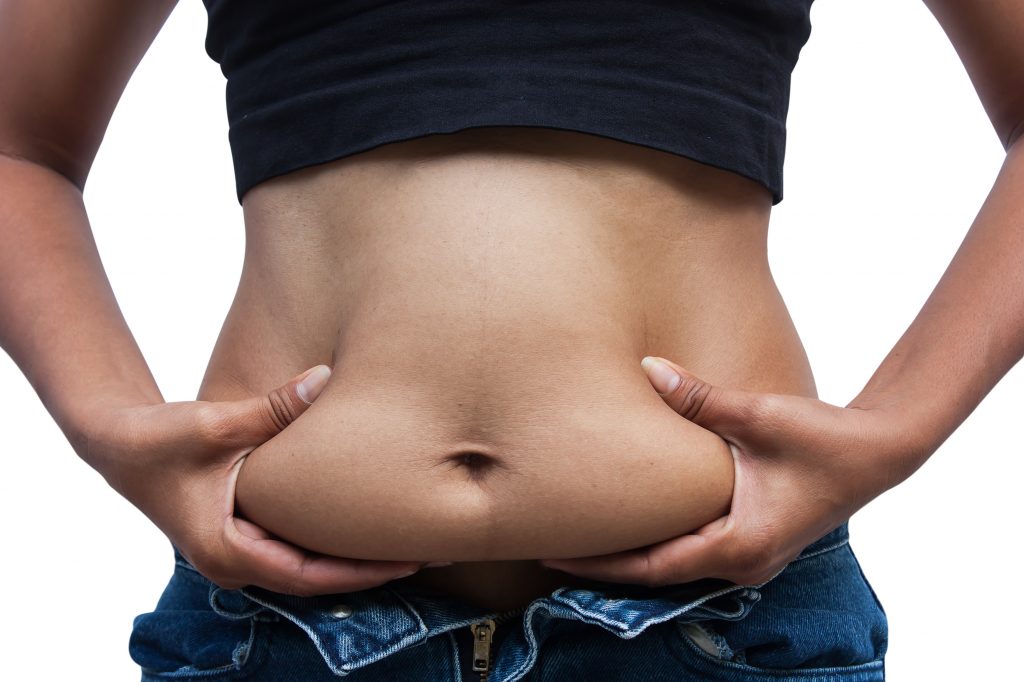
Bloated Tummy vs Pregnant Tummy
When you’re dealing with bloating, it’s usually due to large amounts of intestinal gas or fluids piling up.
The main difference between a pregnant belly and a fat belly is that a bloated one is temporary and typically goes away in several hours but sometimes can last up to several days.
The point is that the belly caused by bloating will eventually go away because bloating doesn’t last forever.
There are lots of foods and drinks that can lead to this, such as dairy products like almond milk, wheat, carbonated drinks, and many others.
So make sure to avoid food that causes you to be bloated. Instead, make sure to pick the food that’s causing you relief instead of pain and inconvenience.
In some situations, a bloated belly can indicate irritable bowel syndrome or small intestinal bowel overgrowth.
If that’s the case, then you’ll also experience constipation or diarrhea and pain in your stomach.
Is It a Hormonal Belly?
Hormones are here to regulate a variety of different body functions. If there’s an issue with them, they will cause different symptoms.
One of them is the so-called hormonal belly. This is what occurs when there’s some imbalance or abnormality in terms of your hormones.
In addition, women who suffer from polycystic ovary syndrome (PCOS) normally gain lots of weight around their tummies.
And some women entering menopause frequently experience a drop in their estrogen level, which increases the amount of fat around their belly.
Keep in mind that different factors can negatively impact your hormones, such as an unhealthy diet, lack of sleep, stress, etc.
All of these things can cause this hormonal belly.
Belly That’s Been Under a Lot of Stress
If you’ve been dealing with stress for quite a while, then this can result in excess abdominal fat, which can cause a stressed-out tummy.
At the end of the day, stress is anything but healthy.
The main culprit for all of this is the hormone called cortisol that’s responsible for regulating stress.
In time, if you do not think of ways to reduce stress, blood sugar will increase which will cause high cortisol levels. There are different ways to reduce stress and stay healthy.
One of the best ways is to try out meditation or yoga, which are not only beneficial for physical health, but for mental health too.
Another thing that you will notice if you’re dealing with a stressed-out belly is that you are constantly overwhelmed and want to eat all the time. You get a feeling like you could eat a house.
The Infamous Beer Belly
There’s a common misconception that only men have this infamous beer belly, but that’s not actually the case.
Even though beer belly can be seen more often in men, women can also have it, particularly the ones who consume vast amounts of alcohol.
They are then at higher risk of having an alcohol belly.
Now, I know that you’ll think that the beet itself is the cause of this type of belly, but that’s actually not the case. Actually, calories are the ones that cause it.
Postpartum Belly or So-Called Mom’s Belly
After delivery, some ladies will notice a bulge beneath their bellies, and that’s something that oftentimes occurs.
At the end of the day, the stretched-out stomach muscles will lose up after delivery, so this shouldn’t come as a surprise.
Precisely then, you’ll be able to see one of the significant differences between a pregnant belly and a fat belly.
Namely, as soon as the baby is born, you will no longer feel the pressure in your tummy, and it will very quickly lose that firmness and will start to look exactly like a fat belly.
If you want to check this, you can do so with a pinch test.
So what are you supposed to do here?
You should squeeze your tummy skin for a bit. If you have more than a couple of millimeters of space between your fingers, then it’s highly likely that you have some belly fat.
And that’s nothing out of the ordinary. It is widely known that in most cases, pregnancy tends to put some weight on your body.
However, I would advise you to wait for a while (for several months) before you start taking these results into account.
The Most Common Causes of Belly Fat
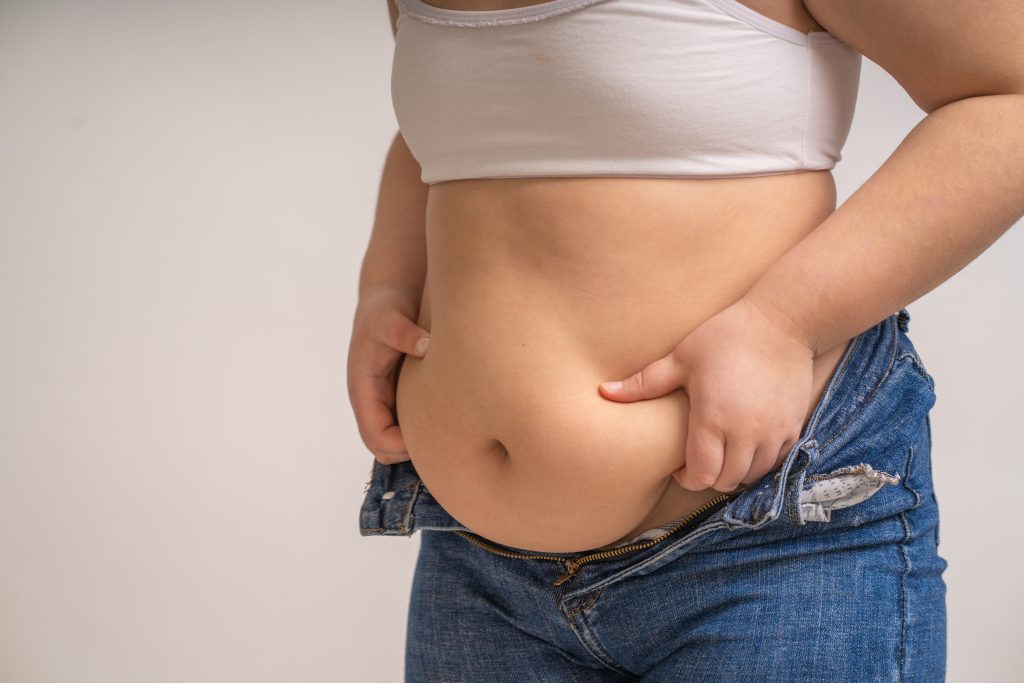
Now, that I have covered some of the main differences between a pregnant belly and a fat belly, it’s time to move on to other things.
Sometimes, women gain fat around their tummy and are unsure what causes it. Well, below, I’ll enumerate the potential causes of it.
Let’s Begin With Diet
Certainly, the major culprit when it comes to a bigger fat belly is precisely this one.
If you’re eating a lot of unhealthy snacks, desserts, and generally foods that are packed with sugar, then something like this will happen. Maybe you should consume more juices.
As previously stated, alcohol, especially beer can cause it too.
It would be advisable to steer clear or at least reduce foods that are considered unhealthy and filled with trans fats, which are normally prepackaged items and baked products.
I would like to remind you that precisely this type of fat results in visceral fat which can frequently cause numerous health issues.
It doesn’t mean that you’ll get sick one hundred percent, but you will increase the risk of it.
Age
Several things can be perceived as negative that happens as we grow older. For starters, your metabolism slows down.
Another thing that occurs as well, is that you are no longer physically active as you used to be. Therefore, when these two things join forces you get a bigger belly.
A vast majority of women gain belly fat when they reach menopause and that’s due to decreased levels of estrogen.
Estrogen is the hormone that is responsible for storing fat in various regions of your body, particularly thighs, hips, and buttocks.
And this all happens to support you while you’re pregnant properly.
However, once estrogen levels start to drop, you will gain fat around the belly in a flash.
Is there any way you can avoid this?
In fact, there is. What you can do is start estrogen therapy. However, you can’t do this just like that.
You first must consult with your physician so he or she can determine whether now is a good time for this or not.
Some Medicines
Different medicines can cause belly fat like birth control pills and antidepressants. Both of these medications can impact your appetite.
In situations when hunger controls your food intake, then it’s practically inevitable to prevent belly fat.
It’s worth mentioning that not all medications store fat the same way. For example, women who are currently on corticosteroids will most likely notice that their tummy has become bigger along with their face and arms.
But that frequently goes away once you stop taking these medications.
And then some make you feel very tired and moody, making it pretty hard to move, let alone have any form of physical activity.
That’s precisely when belly fat occurs. If you want to prevent this, then try somehow to motivate yourself to at least take a walk, if nothing else.
Sedentary Lifestyle
Leading a life without practically no physical activity can be no good for your health. On the contrary, this form of lifestyle can result in a variety of different health conditions.
The most common ones are type 2 diabetes, heart-related problems, obesity, cancer, and many others.
Apart from all of this, being inactive for a longer period of time is going to influence your immune system too negatively.
That’s why whenever you can, you should either exercise or have any other form of physical activity. It doesn’t necessarily mean that it has to be something that’s too intense.
Even a light walk will get the job done. Better something than nothing, am I right? Bear in mind that the human body is not designed to be in a sedentary position continuously.
Genetics
Age is not the only factor that can contribute to weight gain. Another cause of weight gain (and many other things) is genetics.
There are different gene variants and genes, in general, that influence not only the metabolism but also how your body is going to react to carbs and fat.
One of the genes that will cause you to gain weight (which can lead to obesity as well) is the infamous FTO gene.
And Last but Not Least – Chronic Stress
When someone is gaining weight, they rarely think that chronic stress has caused that extra weight, which is a bit odd, I must admit.
So what happens during this process?
Namely, when the primary stress hormone, known as cortisol, is in excess, it moves through your body for a while.
And precisely this can result in cortisol belly fat.
If you’ve noticed that your appetite is increased, it can be because of it.
When someone is under a lot of stress, they will hardly opt for something that’s healthy but will instead eat things like processed foods, foods that are packed with sugar, trans fats, and many other things.
What About Pregnancy?

Now that I’ve thoroughly written about belly fat, it’s time to focus on pregnancy so you can easily figure out if you’re currently pregnant or not.
So, let’s go through some of the most common pregnancy symptoms that will tell you you’re pregnant.
Missed Period
One of the most common pregnancy symptoms that almost always forces you to ask yourself if you’re pregnant is precisely this one.
If you’re cautious when it comes to your menstrual cycle, then you’ll quickly figure out that something is “wrong”.
On the other hand, for women who do not pay attention to the menstrual cycle, or have irregular periods, this pregnancy symptom may not mean anything in particular to them.
When you miss a period because of the pregnancy, you will most likely still have some symptoms that will resemble period symptoms.
Now, if you’ve missed your period, plus you’re sexually active, it doesn’t instantly mean that you’re pregnant. There could be numerous reasons why you’ve been gaining weight.
Morning Sickness
Morning sickness isn’t something that every pregnant woman experiences. Most of them yes, but still not all of them.
Morning sickness usually “appears” around five or six weeks of pregnancy; however, sometimes, it may happen even sooner.
As I previously stated, not every woman will experience morning sickness. According to the statistics, eight out of ten women will have it.
Even though this is one of the most common symptoms of pregnancy, don’t forget that there could be a variety of different ones that can cause it.
Let’s Discuss Spotting
Spotting isn’t something that’s uncommon among women who are not pregnant. At times (when you’re about to get your period), your body is trying to get rid of toxins, which leads to spotting.
However, oftentimes, it can be caused by birth control. If you’re using birth control pills, it would be wise to tell that to your healthcare provider.
When you’re pregnant, the embryo has to implant itself into your uterine wall, which is also known as implantation.
Implantation can lead to spotting at roughly four weeks pregnant.
Normally, when you’re experiencing spotting, you’ll notice a color that’s either brown or pink; it’s not bright red.
On the other hand, if you’ve been experiencing missed periods, yet you’re not pregnant (which was confirmed by both the doctor and pregnancy test), then it would be smart to talk to your doctor.
Mild Cramping
During early pregnancy, some women tend to experience mild cramping, which is often mixed with aforementioned implantation bleeding.
So what does it mean?
It means that the baby has been implanted successfully.
On the flip side, if you’ve been having frequent cramps, yet you’re not on your period, nor you’re pregnant, then I suggest talking to your physician just to uncover the underlying cause.
It can oftentimes be endometriosis which can be a pretty serious condition, but luckily, treatable.
Stomach Bloating
A bloated stomach is frequently confused with a pregnancy belly because of its firm look.
However, sometimes, a precisely bloated tummy can signify that you’re pregnant (but you still don’t know it).
Why does this happen?
Well, it’s most likely due to pregnancy hormones, particularly at the beginning of pregnancy. Our bodies are actually very smart.
During pregnancy, the progesterone hormone is prone to rising as the uterus extends, pushing the lower abdomen up.
And precisely this can lead to bloating and you may even notice some changes in your bowel movements as well. So if you are not sure if you’re pregnant or not, then be sure to purchase some reliable pregnancy test.
Changes In Your Nipples
Sometimes, even in the early stages of pregnancy (when you’re just a few weeks pregnant), you may notice some changes to your nipples. You’ll most likely notice that they’ve become darker and at times, even an early milk production.
If something like this happens, then I would advise you to obtain some small milk pads to help you with this.
Movement
If you are later in the first trimester of pregnancy, you may experience fetal movement. Many women do not feel it until they enter the 16th week of pregnancy.
If this is your first time being pregnant, then you may feel this even later.
Conclusion
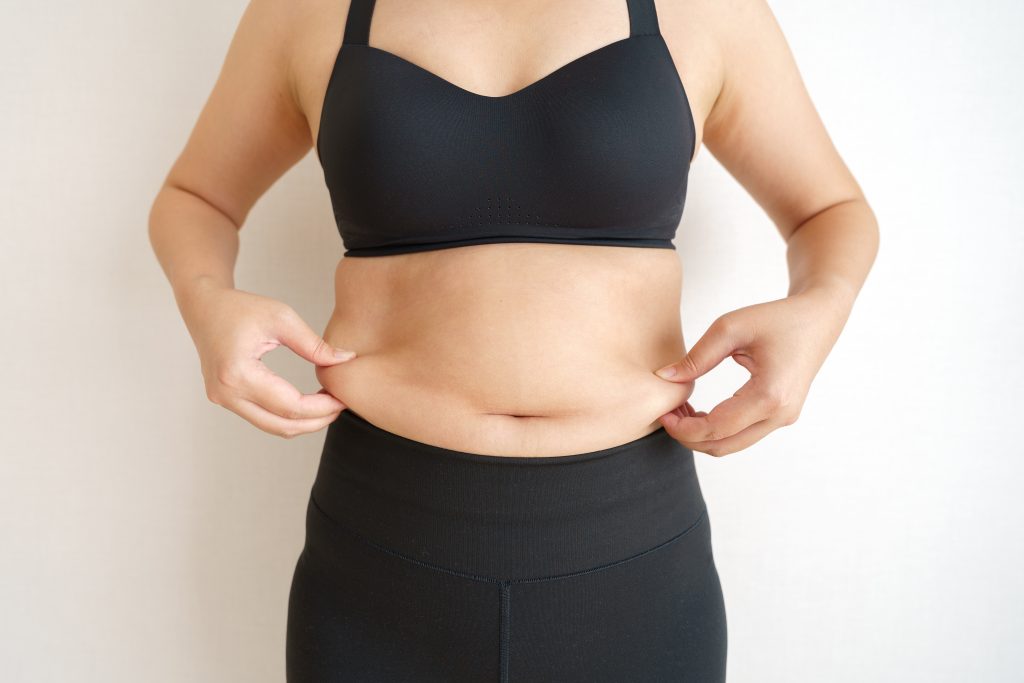
I hope that after everything that’s been said and done regarding the pregnant belly vs fat belly topic, you finally know the difference between a pregnant belly and a fat belly.
I mean, everything that I wrote here was just some guidelines.
However, whenever you’re in doubt, please be sure to consult with your doctor just to see if you’re truly pregnant or if you were just too hungry for an extended period of time.

Well, hello there!
My name is Jennifer. Besides being an orthodontist, I am a mother to 3 playful boys. In this motherhood journey, I can say I will never know everything. That’s why I always strive to read a lot, and that’s why I started writing about all the smithereens I came across so that you can have everything in one place! Enjoy and stay positive; you’ve got this!
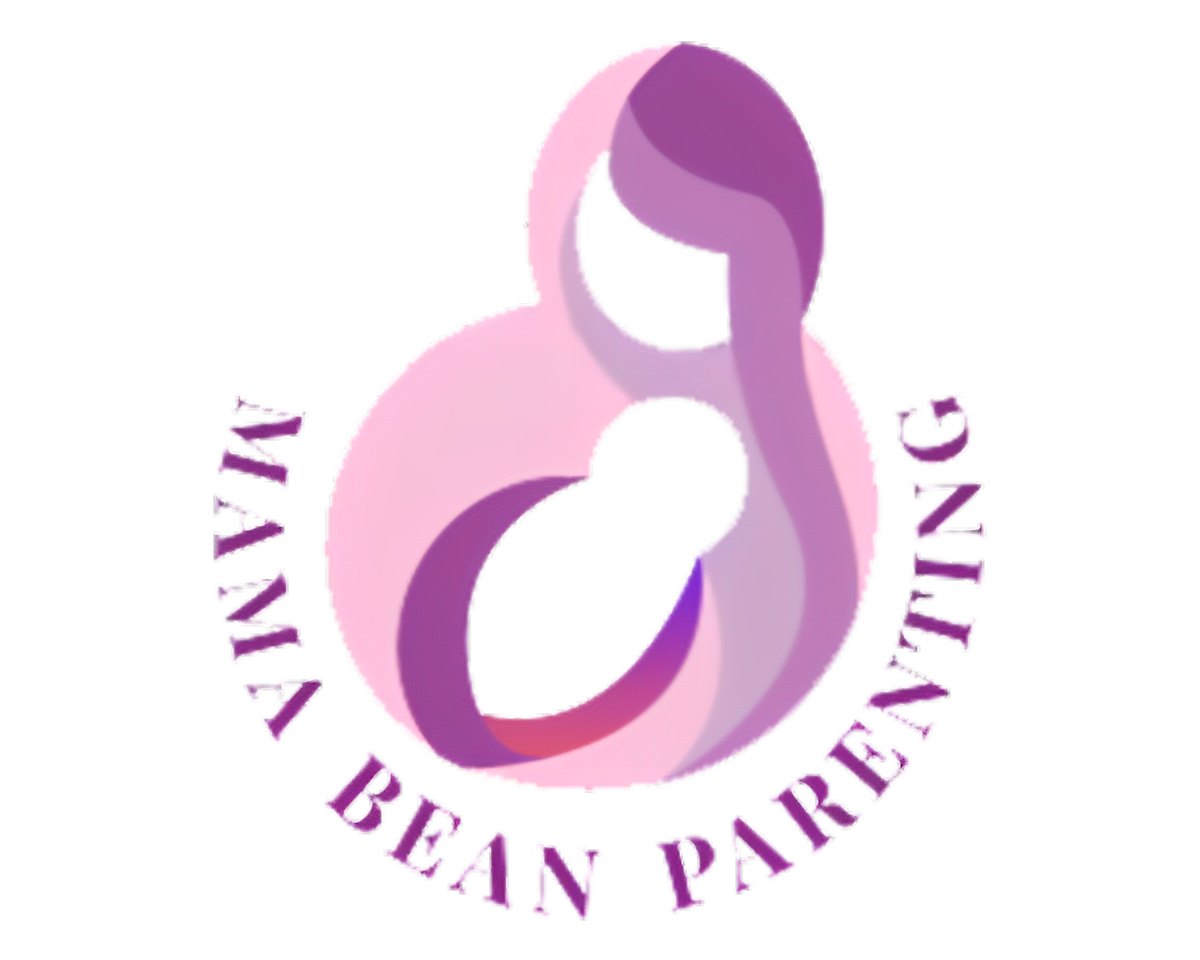
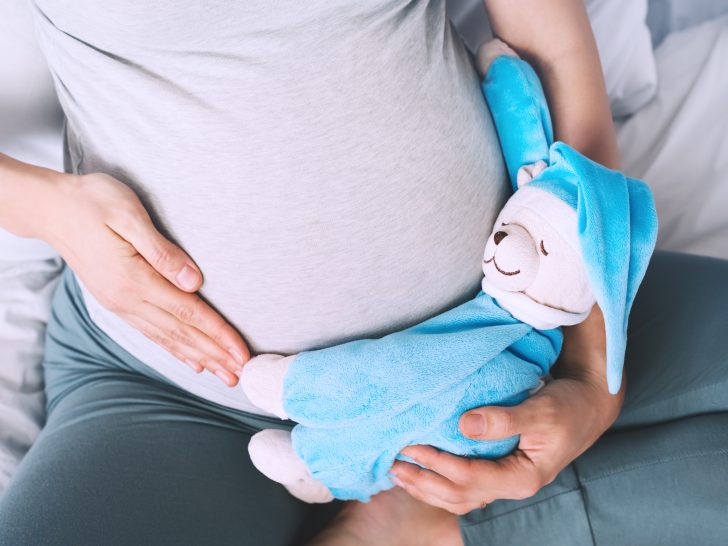
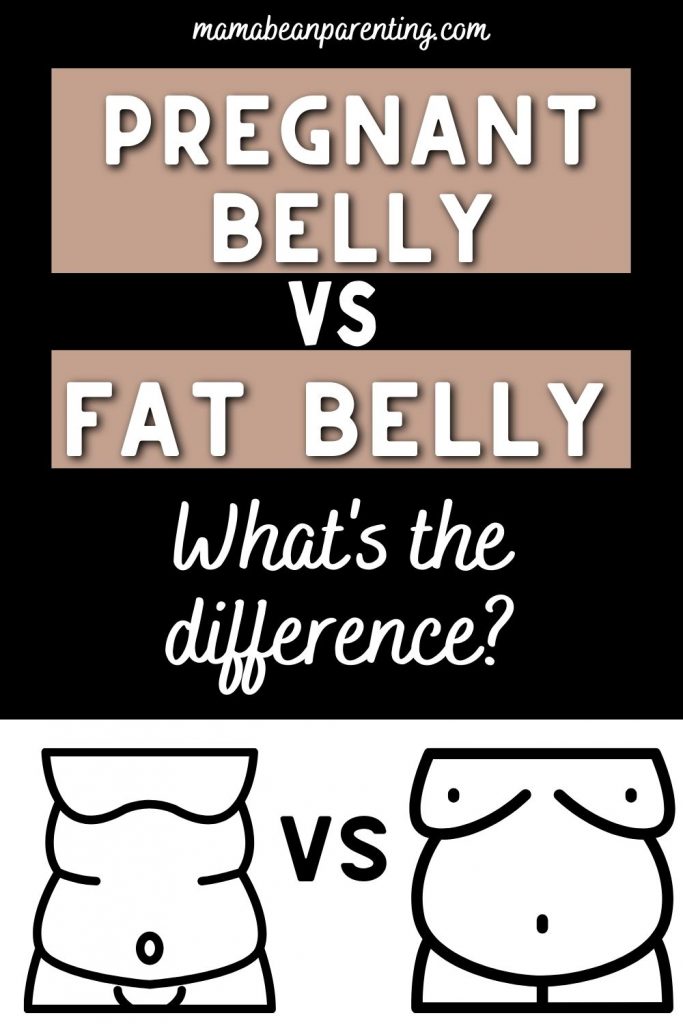
Why Is My Pregnant Belly Soft When I Lay Down? • Mama Bean Parenting
Tuesday 28th of March 2023
[…] It’s good to learn more about the differences between a pregnant belly and a fat belly. […]